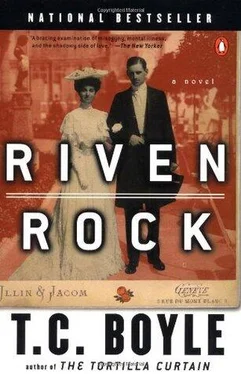T. Boyle - Riven Rock
Здесь есть возможность читать онлайн «T. Boyle - Riven Rock» весь текст электронной книги совершенно бесплатно (целиком полную версию без сокращений). В некоторых случаях можно слушать аудио, скачать через торрент в формате fb2 и присутствует краткое содержание. Год выпуска: 1999, Издательство: Penguin Books, Жанр: Современная проза, на английском языке. Описание произведения, (предисловие) а так же отзывы посетителей доступны на портале библиотеки ЛибКат.
- Название:Riven Rock
- Автор:
- Издательство:Penguin Books
- Жанр:
- Год:1999
- ISBN:нет данных
- Рейтинг книги:5 / 5. Голосов: 1
-
Избранное:Добавить в избранное
- Отзывы:
-
Ваша оценка:
- 100
- 1
- 2
- 3
- 4
- 5
Riven Rock: краткое содержание, описание и аннотация
Предлагаем к чтению аннотацию, описание, краткое содержание или предисловие (зависит от того, что написал сам автор книги «Riven Rock»). Если вы не нашли необходимую информацию о книге — напишите в комментариях, мы постараемся отыскать её.
Riven Rock — читать онлайн бесплатно полную книгу (весь текст) целиком
Ниже представлен текст книги, разбитый по страницам. Система сохранения места последней прочитанной страницы, позволяет с удобством читать онлайн бесплатно книгу «Riven Rock», без необходимости каждый раз заново искать на чём Вы остановились. Поставьте закладку, и сможете в любой момент перейти на страницу, на которой закончили чтение.
Интервал:
Закладка:
He wasn’t wearing a shirt, his chest and arms filthy, a crust of blood like a badge over his right nipple; she was crumpled in the closet, as wet and redolent as a meatball. She’d cleaned up the kitchen three times already, working like a slave, like a maniac, and three times the after-shocks had brought everything down again, including the big pot of sauce she was making to feed everybody, because there was nothing, nothing to eat, and the poor people in the cottages with their stoves collapsed and their iceboxes smashed, what were they going to do? He saw it all in an instant, and if he needed the details to complete the picture, he would get them later, when night had fallen and there was no light but for the kerosene lanterns and Mr. McCormick was settled in the theater building and everybody on the estate had eaten sandwiches with fresh-squeezed orange juice and he took her deep into the big deserted stone house and found a bed and lay in it with her till the light came and he never wanted to get up again.
As for Mr. McCormick, he adapted readily enough to the theater building while repairs went on in the main house (after a short but violent period of adjustment, that is), but all the spirit seemed to have gone out of him when the earth stopped shaking. There was no novelty anymore, nothing new, and he sank back into the morass of his hopeless and stultified mind, so that by the time Dr. Kempf came to redeem him he’d regressed so far that O‘Kane and Mart had to drag him into the shower bath each morning, force the deadweight of his limbs into his clothes and spoon-feed him at the table. And that was no pleasure at all.
Dr. Kempf didn’t rush into things the way Brush had, and he didn’t bluster or boom or pin Mr. McCormick to the floor — better yet, he wasn’t a Kraut and he didn’t have a beard. He was forty-one years old when he took over for Dr. Brush in the autumn of 1926, the author of two books (The Autonomic Functions and the Personality, 1918, and Psychopathology, 1920) as well as innumerable learned papers, and he’d most recently been a clinical psychiatrist at Saint Elizabeth’s Hospital in Washington, D.C., before setting himself up in private practice in New York. He was of medium height and build, the hair on his crown was so sparse and so severely slicked and pomaded it looked painted on and he had a dazzling full-lipped smile that was the key to his success on the interpersonal level. That and his eyes, which were a sympathetic and liquid brown — and perfectly round, as round as twin monocles set in his head. The McCormicks wanted to make him rich — or so it seemed to the amazed nurses when they discovered how much he was making per month: a cool ten thousand dollars. Mart, who had no great head for sums, was nonetheless quick to point out that that added up to $120,000 a year, more even than the King of Abyssinia could expect to make. If there was a King of Abyssinia.
He settled himself, along with his wife, Dr. Helen Dorothy Clarke Kempf, at Meadow House, a princely stone-and-frame dwelling the McCormicks had erected on the southern verge of the estate for the comfort of the physicians, who could thus be near at hand in the event of an emergency. Dr. Brush had lived there for a time, and Dr. Hoch too, but Brush had opted eventually for town life and Hoch had moved on to less roomy accommodations, six feet underground. O‘Kane tried to get some sort of fix on the new doctor — he didn’t want to get his hopes up too high and yet he couldn’t help himself — and during Kempf’s first week he attempted to read one of the doctor’s learned articles in the Journal of Abnormal Psychology. It was called, promisingly enough, “A Study of the Anaesthesia, Convulsions, Vomiting, Visual Constriction, Erythemia and Itching of Mrs. V G.,” but it was dry as the stuffing of an old mattress and O’Kane nodded off twice just trying to get through it. In fact, in later years he kept a copy of it at his bedside as a soporific in case he couldn’t get to sleep.
The man himself was easier to read, thank God, and O‘Kane liked him right from the start, from the first minute he walked into the room with his uncomplicated smile and took O’Kane’s hand in a good dry firm honest grip. Brush was there at the time, hearty and big-bellied and roaring, but Kempf had been closeted with his predecessor all morning and made it clear that O‘Kane was the man he wanted to talk to. They were in the office in the theater building, three in the afternoon, day one of Dr. Kempf’s regime, Brush packing his books and effects in cardboard containers, Mr. McCormick napping quietly in the stone house under Mart’s semi-watchful eye. Kempf asked a few questions about Mr. McCormick’s present state, but Brush kept interfering, so finally he took O’Kane by the arm and steered him out into the theater itself, a cavernous high room with the chairs all set out in rows, acoustic panels on the walls and a deep mid-afternoon hush hanging in the air. They sat in two folding chairs under one of the big iron-girded windows, and Dr. Kempf leaned forward confidentially. “So tell me, Eddie,” he said, and his voice was like Dr. Hamilton‘s, smooth and hypnotic, “can it really be true that Mr. McCormick has had no contact whatever with a woman since, what was it, 1907? 1908?”
“Contact? He hasn’t even seen a woman, not even on our drives, which we’ve been very careful about, back roads and all of that.”
“And why is that?”
“Too dangerous. In the old days, in the beginning, when we first came out here, that is—”
“Yes?” Kempf was intent and concentrated, the annular eyes, the shining smile, as fixed on Eddie O‘Kane as the needle of a compass.
“Well, he would attack them — women. Beat them. Maul them.” O‘Kane was remembering that girl on the train, the one going home to Cincinnati with her mother, and the way Mr. McCormick had pinned her down and forced his hand up her privates — and how he’d brought his tongue into play and licked her throat like a cow at a salt lick. Or a bull. A rutting bull.
“Did anyone ask him why he had all this hostility toward women? Dr. Hamilton? Dr. Meyer? Did you?”
O‘Kane shifted in the chair. The seat was narrow and hard. “It was a sexual thing,” he said, “very disturbing for all concerned. I was embarrassed, to tell you the truth. And besides which, he went catatonic about then, and nobody could ask him anything — or you could ask all you wanted, but he wouldn’t answer.”
“But that was a long time ago,” Kempf said.
“Eighteen years. Nineteen. Something like that.”
Kempf leaned back in the chair, the hinges creaking under his weight. He had his hands wrapped behind his neck as if he were basking in the sun and he closed his eyes a minute, deep in thought. “He hasn’t made much progress, has he?” he said finally, snapping open his eyes and bringing the chair back to level again.
O‘Kane could hardly deny it. He shrugged. “He has his periods.” “I’ve been studying this, Eddie,” the doctor said, handing him a manila folder with several sheets of bound typescript inside. It was a year-by-year account of Mr. McCormick’s condition, from the onset of his illness right on up to the present, and as O’Kane glanced over the entries he had the uneasy feeling that he was reading a shadow biography of himself — he was the one laboring just off the page here, he was the one living, breathing, drinking, shitting, sleeping and whoring through all those compressed and hopeless years:
In 1908, when the patient was seen by Drs. Kraepelin and Hoch, he was diagnosed as suffering from the catatonic form of dementia praecox. At that time he was tube-fed and refused to walk.
In 1909, there occurred some mental clearness, then delirous excitement, after which he became dull. He continued to be spoon-fed and refused to move his bowels, but began to walk with the aid of his nurses.
Читать дальшеИнтервал:
Закладка:
Похожие книги на «Riven Rock»
Представляем Вашему вниманию похожие книги на «Riven Rock» списком для выбора. Мы отобрали схожую по названию и смыслу литературу в надежде предоставить читателям больше вариантов отыскать новые, интересные, ещё непрочитанные произведения.
Обсуждение, отзывы о книге «Riven Rock» и просто собственные мнения читателей. Оставьте ваши комментарии, напишите, что Вы думаете о произведении, его смысле или главных героях. Укажите что конкретно понравилось, а что нет, и почему Вы так считаете.












